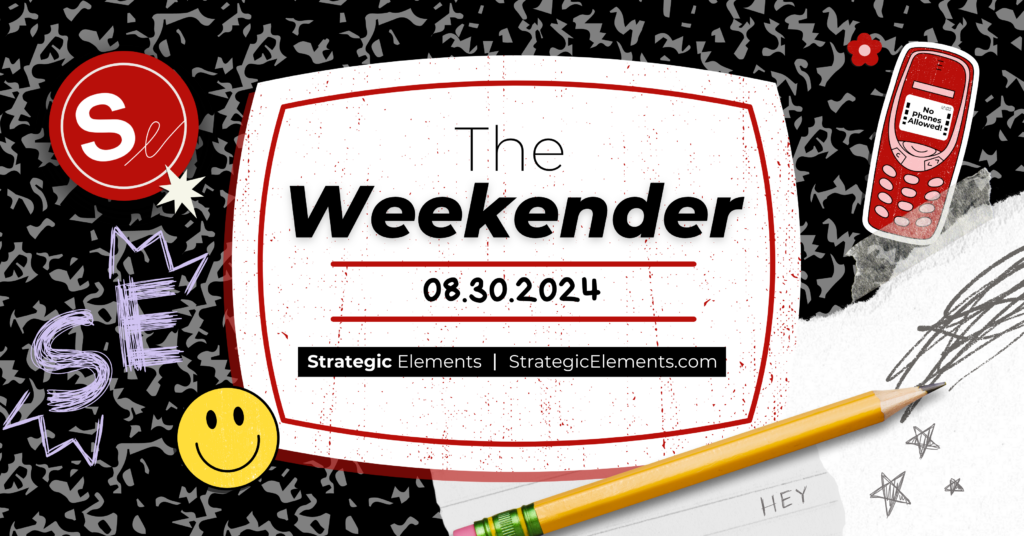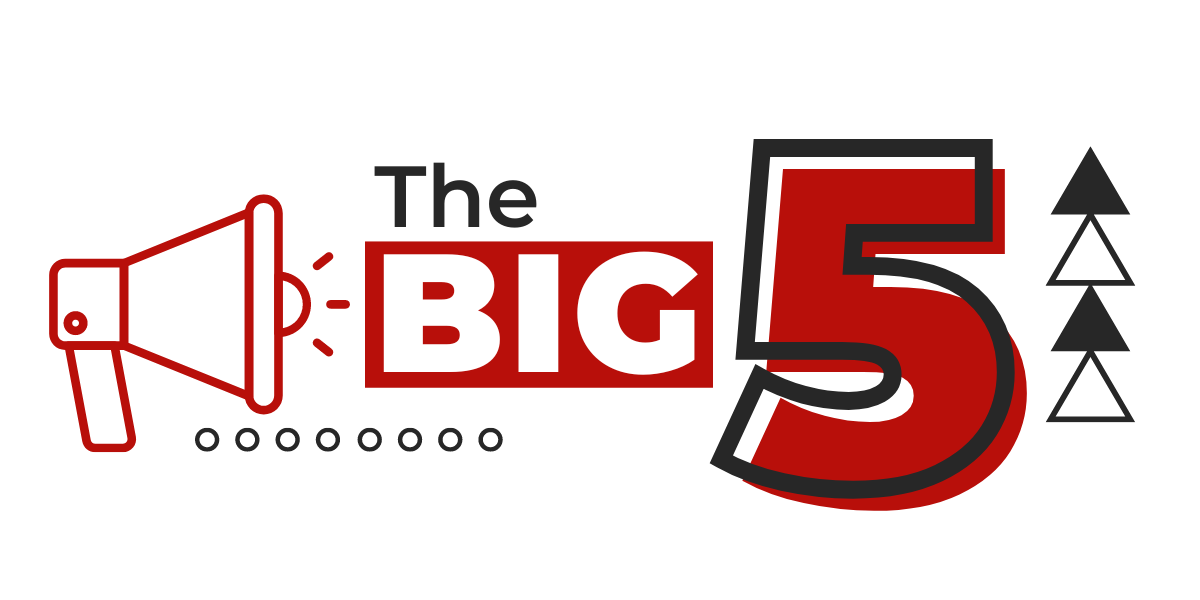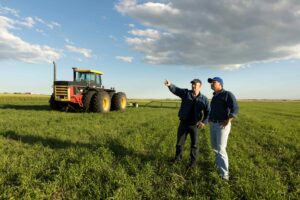DATA POINTS
- 14.3: The average number of sick days Gen Z workers take per year, compared to baby boomers’ 8.9 sick days
- 92: The number of American journalists and government officials banned from Russia
- 4,400: The number of athletes competing in the Paralympics that started this week
- 10/20:The day the new iPhone 16 hits shelves
- $1,100: The amount the average household that engages in sports betting spends annually
- $100M: The amount Travis and Jason Kelce made in a deal with Amazon for their podcast “New Heights”
Sleeper Swing States
The summer of 2024 could have been a Shonda Rhimes political drama. What started as a match between the two oldest candidates in U.S. history saw twists including a lackluster debate performance, a failed assassination attempt, and a change in a lead role.
With the summer months coming to a close and just 66 days until the election, the ticket is locked in. The Democratic Party stands behind Vice President-turned-nominee Kamala Harris to face Donald Trump. Trump is pulling muscle and championing his MAGA message to win over undecided voters, including recent-competitor RFK Jr. and former Democrat Tulsi Gabbard.
Polls are tightening across the country, and it’s anyone’s game. While the two campaigns are rightfully focusing on the tried-and-true swing states, solid-color states turning purple is on-brand for 2024. Florida, Texas, and Virginia are showing signs of tightening and may expand the electoral college map heading into November.
Texas
Texas – the apple of the Democrat’s eye. State demographics are changing every day. Americans from around the country are flocking to the state. Its Southern border is a fluid mixing pot of Mexican and American communities. Several studies put Harris within 3 to 5 points of Trump in Texas – and Senator Ted Cruz is facing a harsher electoral reality than Trump. Keep in mind Democrat Beto O’Rourke nearly removed Cruz from office in 2018: Cruz: 50.9% / O’Rourke: 48.3%. Republicans may scoff at the notion of Texas going blue, but little can be done about shifting demographics. With 40 electoral votes on the table, Democrats are salivating at the prospect of lassoing the Lone Star State.
Florida
Harris winning Florida is a big ask since there are 1 million more registered Republican voters than Democratic voters in the state. However, she is currently only 4 points behind Trump. With marijuana legalization and reproductive rights bouying her in Miami-Dade, she may have a chance for an upset and bask in the Sunshine State.
Virginia
Biden won Virginia by 10 points in 2020, and Clinton won it by 5 points in 2016. Prior to President Biden’s retirement, Trump was leading him in state polls. Harris is only ahead of Trump with VA voters by 3 points – a margin that could be overtaken if the Trump team dedicates itself to turning the Old Dominion red again.
The political landscape isn’t what it was four years ago. Or even six months ago. Times are changing, and it’s anyone’s game.
 From Farm to Market
From Farm to Market
With harvest just around the corner, farmers anticipate higher yields across the United States, but few of them are jumping for joy. Corn and soybeans are selling for much lower prices than they did in 2021 and 2022, and many farmers do not see an opportunity to break even with their harvests. Fertilizer prices are at a record high amid the Russian offensive in Ukraine. Paired with rising labor costs, higher seed expenditures, and expensive fuel prices, farmers are struggling. Land rent has also increased every year, further burdening farmers with financial struggles.
The USDA released that net farm incomes will drop by nearly 25% this year and University of Illinois economists say state farmers may lose up to $118 per acre of corn and $81 per acre of soybeans. While an unforeseen international event could spike the price of crops, Russia and Brazil are stealing the limelight in crop production and offsetting the U.S.’ leadership in exports.
Some producers are finding new income streams to offset lost revenue while keeping the operation in the family. Wind and solar energy installations are increasing in popularity and offer numerous benefits to private farm operations including drought-proof payments, lower electricity bills, and tax incentives.
Read More at The Wall Street Journal
The Data Behind the Curtain
The ubiquitous breakthrough of the internet brought the promise of transparent and readily available information. The bigger the web gets, the more information is being hidden by the biggest sites online. Platforms like Facebook, X, Reddit and Google search gobble up user data and, in many cases, feed it into an algorithm that effectively presents similar content as to what an individual has previously been interested in. If you’ve ever spent time scrolling through Instagram reels, YouTube shorts, or TikTok, you’ll notice almost immediately that these algorithms are good. Really good.
While these systems give consumers what they are looking for before they know it themselves, the data is being increasingly hidden behind technological veils. Meta recently closed down CrowdTangle, which enabled users to measure engagement on posts and accounts, following journalists discovering Facebook’s preference to highlight hyper-political content. X, Reddit, and other social networks are limiting backend access fearing AI bots scraping their sites for user data.
This data is not only valuable for individuals, but it can track the newest trends, real-time updates into what people are talking about, and what they care about at any given moment. While small businesses looking to target a certain demographic can still buy ads to hit their marks, it may spell trouble. The internet was made to open doors; it is now closing them and locking them in the process.
TTYL… Heading Back to School
As schools kickstart the new academic year, a noticeable trend is emerging: more and more districts are cracking down on cellphone use during school hours. This shift is driven by concerns about how the constant connectivity to phones could be affecting students’ mental health and focus.
In places like Clark County, Nevada, and Hillsborough County, Florida, students will have to store their phones in pouches during classes. This rule is being put into place because of a growing belief that smartphones are distractions that hinder learning and social interaction.
The pushback against phones is driven by concerning data. Research shows that social media can increase anxiety, depression, and other mental health issues in teens. Teachers and parents are also frustrated because phones can disrupt classes and sometimes cause problems.
It’s important to consider another perspective. Many students and teachers believe that phones can be useful for learning and want a balanced approach. The real challenge is figuring out how to use technology in a positive way while reducing its distractions.
As schools test out these new rules, it’s clear that the debate over cellphones isn’t over. Whether these bans will help students focus better and improve their mental health or just lead to new ways for students to stay connected is still unclear. For now, it looks like schools are leaning towards having fewer phones in the classroom.
Read More at The Washington Post
Money May Equal Happiness
A recent survey reveals that a majority of Americans suspect a stuffed bank amount makes for happier people. 56% of Americans would be content with $200,000 worth of liquid assets. This number sharply contrasts with reality. At the end of 2023, the average American pulled in slightly above $59,000. As people make more money, the amount they say would make them happy also increases, but with diminishing returns. Of those making $40,000 a year, 74% said a $150,000 salary would make them content, compared to 64% of those already earning $150,000.
Diving deeper, earning and having more money does not make a person happy. Rather, it eliminates the problems that negate happiness. Being unable to afford food, save for emergencies, go on vacation, or provide for their families are stressors – and they remove a person’s ability to be happy. Once a person earns enough that their needs are met and they can save for rainy days, then they are free to pursue happiness. Dollars do not make a person happy – but they can stop a person from existing in a cycle of struggle.
See you next week!
Be sure to follow us on Facebook, Twitter, and LinkedIn for more news and industry updates. To receive a copy of The Weekender in your inbox, sign up here.





 From Farm to Market
From Farm to Market



